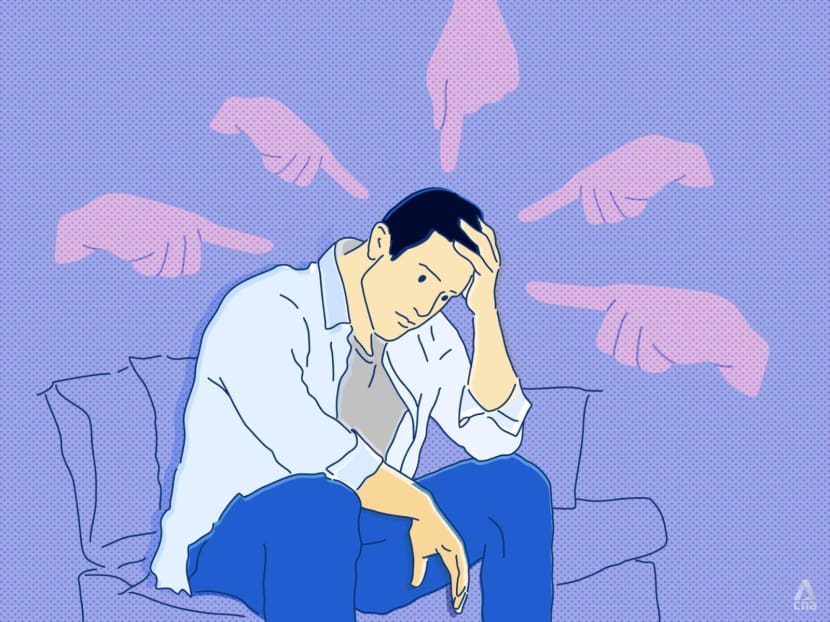Feeling guilty about something that's not your fault? Here's how to cope
Guilt, one of the most common emotions, can be beneficial if justified, but can be quite harmful if it's based on circumstances beyond the person's control, experts told CNA TODAY.

After speaking to experts of the mind, CNA TODAY journalist Renald Loh learnt that guilt can be considered "natural" or "unhealthy" depending on the source of the emotion. (Illustration: CNA/ Samuel Woo)

This audio is generated by an AI tool.
As a 10-year-old, I was introduced to the concept of guilt after accidentally dropping a dumbbell on a friend’s foot and breaking another classmate’s family heirloom. Both incidents happened in the space of a month.
I was mortified. And while my friends displayed grace and maturity beyond their years and bore no grudges towards me, I recall not being able to look them in the eyes for several weeks.
Guilt is a tangible, uneasy feeling in the stomach that circles around and lingers for days on end. It is horrible, but looking back at those childhood incidents, the feeling seemed justified and served me right given my careless actions.
Guilt still finds me frequently as an adult. At this stage of life, however, it’s harder to tell whether it deserves a seat at the table of emotions.
When I occasionally fall short of my own standards at work or in my personal relationships, I am often overwhelmed by a nagging feeling that I did not try hard enough, and believing that I deserved to be skinned for it.
I vividly recall a time where I felt submerged in a pool of remorse for being emotionally unavailable to the friends I held dear due to other developments in my own life. In short, it was a heavy dose of guilt.
I often observe guilt in those around me too.
Colleagues who feel bad for going on leave and end up working anyway thus depriving their loved ones of quality time together. On a more tragic level, friends who feel like they could have prevented loved ones from taking their own lives.
All this musing on the issue of guilt left me wondering if it's a normal emotion, and if perhaps there are "good" types of guilt and "bad" types.
Are feelings of guilt justified? And how can we deal with these feelings?
To get a better understanding of an emotion with a penchant for dragging people down, I spoke to some experts.
IS THIS NORMAL?
Guilt is often a natural and common emotion, and it can even be helpful in motivating us to make positive change, I was told by several experts of the mind.
This emotion helps us reflect on past behaviour and prompts us to take responsibility, especially when others are affected by that behaviour.
However, in some instances guilt can move beyond what is normal and into “unhealthy” territory, they warned.
Dr Sanveen Kang, lead clinical psychologist and founder of Psych Connect, said you can ascertain whether guilt is unhealthy by reflecting on the intensity, duration and effect of the guilt on your well-being and behaviour.
But first, one should determine where the guilt comes from.
Natural guilt, Dr Kang said, stems from specific actions or decisions that have a clear cause you can identify and address.
For example, your careless actions as a cyclist may have caused an injured pedestrian to use crutches for a week.
“Unhealthy” guilt, on the other hand, often originates from us having unrealistic expectations, such as by holding ourselves to “impossible standards”.
For example, Dr Kang said that she had a teenage client who consistently felt guilty about upsetting her parents. The teenager had blamed herself as not being "a good and worthy child" for her parents’ feelings of anger. She also felt guilty for experiencing anything other than happiness for fear of burdening them.
Consultant clinical psychologist Dr Roy Chan, the founder of the psychology clinic Cloaks and Mirrors, added that another sign of unhealthy guilt is taking responsibility for things that are beyond our control.
Some people who feel guilt after a parent dies believe they are responsible because they feel they could have done more — by sending them to the hospital sooner or by spotting certain health symptoms earlier — even though they are not medically trained.
Dr Chan added that there are other key signs that the guilt we feel may teeter on the wrong side of normal. These include:
- Constantly criticising ourselves or feeling like we cannot forgive ourselves
- Finding that we are punishing ourselves as a remedy to balance our feelings of guilt
- Denying ourselves of our basic needs such as food, water, sleep
- Believing that we do not deserve to be happy
“In summary, guilt is unhealthy when it affects our functioning, or makes it harder to hold healthy relationships with both ourselves and others,” he said.
Dr Kang noted: “If the guilt feels unresolvable, it can create a cycle where you are unable to forgive yourself or move forward. It then becomes more of a self-punishment than a motivator for positive change.”
UNRESOLVED GUILT CAN TAKE ITS TOLL ON YOU
While a healthy level of natural guilt pushes us to have better, more fulfilling relationships, unhealthy guilt can be crippling.
Psychologists and counsellors said that persistent and unresolved guilt can have significant long-term consequences that affect both our physical and mental health.
They added that it is not uncommon to encounter patients seeking professional help for this.
“Physically, guilt can cause stomach discomfort, headaches, muscle tension, fatigue, sleep disturbances, and appetite changes,” said Dr Kang of Psych Connect.
“In severe cases, it may even trigger stress responses like an elevated heart rate or high blood pressure.”
Chronic guilt can also heighten the risk of mental health issues such as anxiety and depression.
When guilt feels all-consuming, it can even take control of our lives, said counsellor Clarice Ng of psychological consultancy Mind What Matters.
“When we live with chronic guilt, we may start making life decisions — like career or lifestyle choices — to make up for the wrong we feel we have done, rather than choosing what is best for us at that point in time,” said Ms Ng.
For example, if a child feels guilty for not meeting the expectations or fulfilling the dreams of their parents, they might end up pursuing careers that seem more acceptable to their parents even though it is not what they are interested in.
“If that happens, we eventually lose sight of the kind of life that is meaningful to us.”
In order to “numb the emotional pain” caused by guilt, Dr Kang said that some people turn to addictive behaviour such as substance abuse, gambling and overeating.
They may also develop coping mechanisms like distancing themselves from situations or people connected to the guilt they experience.
Hearing this made me recall all the times I had spent curled up in bed “doom scrolling” on my phone for hours just to distract myself from my unpleasant emotions.
Intuitively, I know that there are healthier and more effective ways to address these emotions, and the experts concurred.
HOW TO OVERCOME AND COPE WITH GUILT
Learning to identify what type of guilt we might be dealing with is crucial and the first step to overcoming it.
Ms Ng of Mind What Matters suggested that we start by recognising what is our responsibility and what is not — and finding out if external factors might have contributed to triggering that emotion.
Ask yourself: Was it something someone said or did that brought up the feelings of guilt?
“The intention here is not to blame another party, but to understand our own experience more holistically,” she said.
Dr Kang added that we should reflect on the source of our guilt to determine if it’s proportionate and rooted in something within our control.
“If you’ve wronged someone, apologise sincerely and make amends, as this can be empowering and helps clear the path forward,” she said.
Ms Ng also noted that it can be difficult for some individuals to find clarity around what their responsibility is, especially in cases where guilt is “deeply entrenched in relational patterns”, like in relationships where guilt-tripping and emotional blackmail are persistent.
In these cases, one first needs to be educated on healthy boundaries, and it is recommended to seek professional help to recognise them.
But regardless of the type of guilt we are grappling with, there are several things we can do to cope and make ourselves feel better.
Emotional regulation strategies such as deep breathing, grounding exercises, or progressive muscle relaxation can also calm intense feelings of guilt, allowing ourselves to approach situations more clearly.
As the experience of guilt can be a solitary experience, Dr Chan of Cloaks and Mirrors believes speaking to others about our feelings can also help us to see a different perspective on what we could have or could not have done in retrospect.
Last, and most importantly: Treat yourself kindly.
“Start by practising self-compassion; remind yourself that everyone makes mistakes and deserves forgiveness, including you,” said Dr Kang.
Negative thoughts can be reframed to more balanced ones by challenging any all-or-nothing or self-blaming perspectives.
Instead, the situation can be an opportunity for learning and growth.
Ms Ng added: “Assure yourself that being kind to yourself does not mean you will not take accountability for your actions.”








